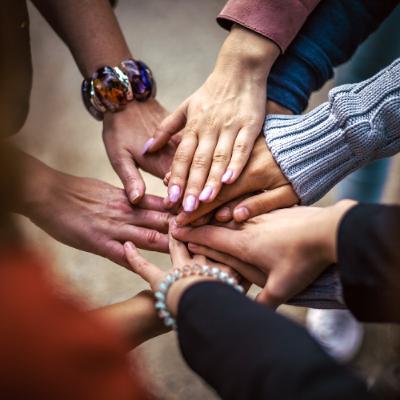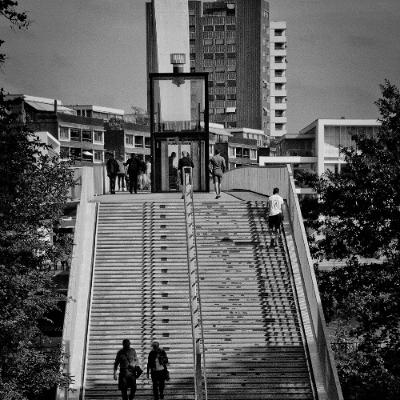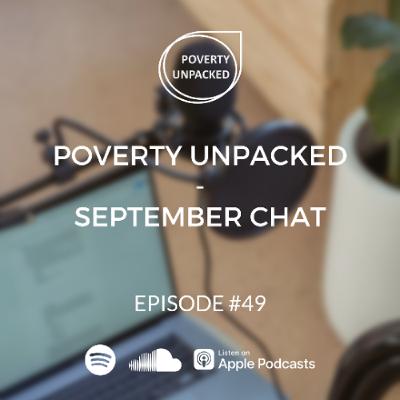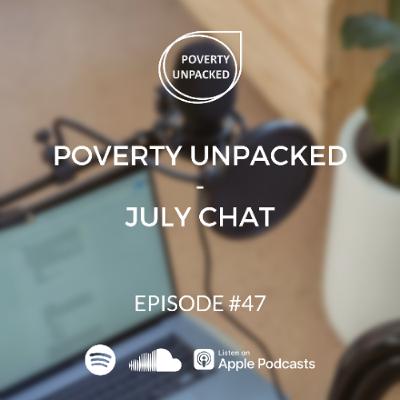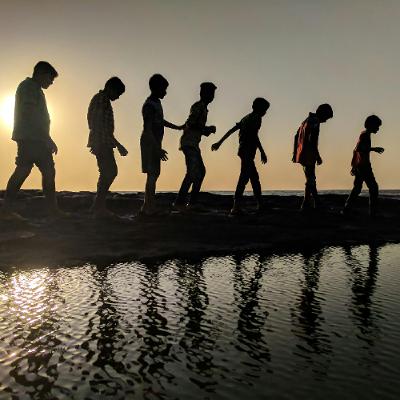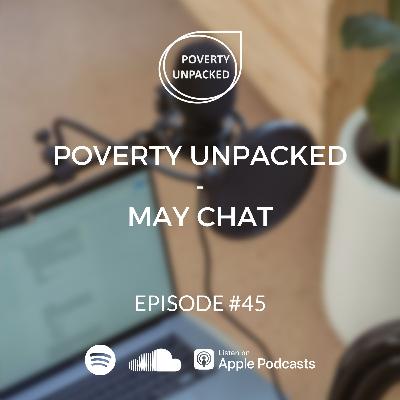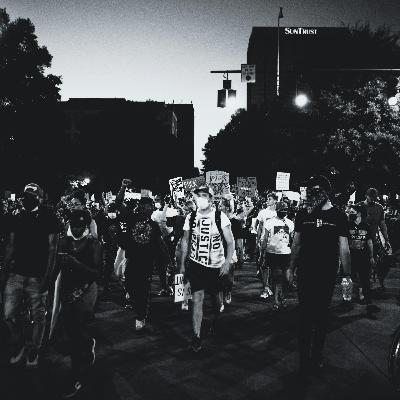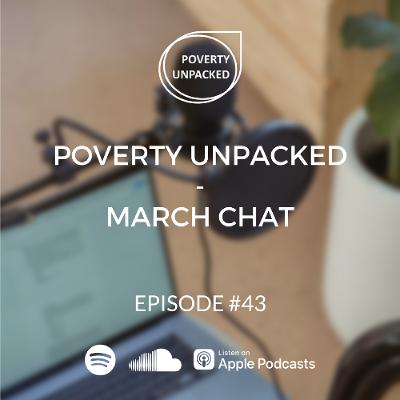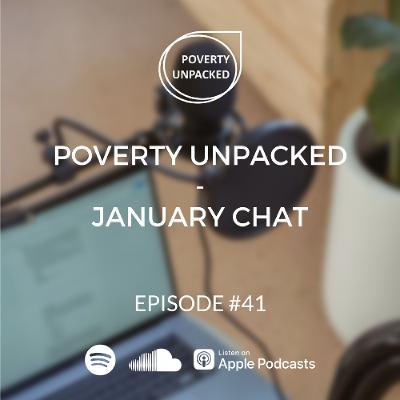Discover Poverty Unpacked podcast
Poverty Unpacked podcast
Poverty Unpacked podcast
Author: Poverty Unpacked
Subscribed: 34Played: 687Subscribe
Share
© All rights reserved
Description
In conversation with others, we explore how poverty affects the mind, relationships, emotions and society as a whole, and what can be done to change it. Hear from activists, researchers, policy makers, and those with lived experience of poverty around the world.
53 Episodes
Reverse
Storytelling about poverty, Softening poverty, Strengthening talents and Trust - the ingredients of Quiet's approach to a growing community of people to come together in countering poverty.
Listen to our conversation with Ralf and Marieke from Quiet Netherlands about their unique approach and key ingredients for establishing and growing communities.
Information about this episode on our website https://poverty-unpacked.org
In this episode of Poverty Unpacked chats, hear about new reports on child poverty, how austerity fuelled the far right, how anti-poverty interventions can support agency, and how new housing areas can be made welcome for residents on low incomes.
Links to all reports and pieces can be found in the notes to this episode on https://poverty-unpacked.org
From the glorification of home ownership to the need for collective action to tackle a collective problem, in this episode we are joined by Cody Hochstenbach to discuss the housing crisis for people on low income in the Netherlands and how to tackle it.
Find more information poverty-unpacked.org, episode 50.
Time for another Poverty Unpacked chat!
This month features new child poverty estimates, pressure on parents due to focus on early childhood, mismatch between policy makers' attitudes and evidence, and EU Anti-Poverty Strategy PLUS what's on in October in the month of the International Day for the Eradication of Poverty.
Check out all the links and more on poverty-unpacked.org
How to address poverty in schools?
Check out this conversation with journalist and author Sean Harris on small but powerful tweaks to classroom practices as well as big and bold policy change beyond school grounds.
More information about this episode and all other episodes on https://poverty-unpacked.org
Time for another Poverty Unpacked chat!
This month features research on poverty in new housing areas in UK and the role of coloniality in social protection policy in Africa. Plus celebrating six months since publication of The Empathy Fix book!
Check out all the links and more on https://poverty-unpacked.org
With only five years to go before the goal of ending extreme child poverty, we are off track to achieve this. But there are valuable lessons from countries that have made significant progress to accelerate efforts.
In this episode, we discuss what works to reduce child poverty with members of the Global Coalition to End Child Poverty.
Find out more on poverty-unpacked.org.
Round up of news on poverty from around the world by host Dr Keetie Roelen.
From reports on child poverty to a call for submission for monologues on homelessness - listen now.
For list of links to all items in this episode, head over to poverty-unpacked.org
Ending poverty requires mass movements. Real change only happens when people come together and stand up against the injustice of poverty.
In this episode, we speak with Rev. Dr. Liz Theoharis and Noam Sandweiss-Back about their
book ‘You Only Get What You’re Organized to Take: Lessons From the Movement to End Poverty’.
Find out more on https://poverty-unpacked.org
Poverty in the UK is high and on the rise. Announced cuts will send more families into poverty.
In this episode, I discuss the latest figures, implications of the announced welfare cuts and importance of redistribution for breaking intergenerational poverty.
Homelessness in the UK is on the rise. Can direct financial support to people experiencing homelessness make a difference?
In this episode, we speak with Greater Change CEO Jonathan Tan to discuss their novel way of working with frontline service providers to help individuals and generating evidence to affect policy change.
Find out more on poverty-unpacked.org
Poverty Unpacked chats are back!
In January 2025, hear about forthcoming book The Empathy Fix, two new reports on astonishing and infuriating wealth inequality and providing input on the issue of welfare and conditionality.
Have you wondered about those armrests on park benches, or spikes on ledges or in hidden corners? They're examples of defensive design and hostile architecture.
In this episode, urban planning expert Cara Chellew explains how hostile design of public spaces affects some of the most vulnerable and makes them less appealing to all.
Check out more on https://poverty-unpacked.org
What does crafting have to do with activism? What contribution can gentle protest make to tackling poverty?
In this episode, we speak with Sarah Corbett, founder of the Craftivist Collective. We hear how a more quiet and kind form of activism can make change happen, and how it can complement other, more traditional forms of activism.
Find out more on the Poverty Unpacked website: https://poverty-unpacked.org/2024/10/19/episode-39-crafting-for-social-justice/
Photo by Robin Prime, credit Craftivist Collective
When you have less to spend, life costs more.
Poverty premiums refer to higher prices that people pay for anything from car insurance to grocery shopping due to having a smaller budget.
In this episode, we speak with Maria Booker, Head of Policy at Fair by Design, a campaign that aims to eliminate unfair poverty premiums.
Find out more on: https://poverty-unpacked.org
October is here!
In the month of the International Day for the Eradication of Poverty, in this chat we reflect on discussions about future of poverty reduction in two recent conferences, and on two new books - one about shame, one about poverty.
Tune in now! Links and more on our website: poverty-unpacked.org
What if programmes aiming to improve people’s lives did a simple thing – give people cash, directly?
In this episode, we're joined by Lydiah Wangechi, Regional Director for East Africa for GiveDirectly, to talk about the benefits and challenges of giving cash directly.
Find out more on our website: https://poverty-unpacked.org/
Catching up on some of the latest news, books, movies and events on poverty in the third of our bi-monthly chats.
This month, we reflect on a recent poll in the UK about the public's attitudes to poverty, discuss a research article on poverty in the US and cover a film called 'Free Money' about a US-based NGO giving cash transfers to a poor community in Kenya.
Links to all content in this episode can be found in the show notes on our website www.poverty-unpacked.org
Enhancing dignity might seem integral to processes of international development, yet dignity often tends to be an afterthought.
Listen to our conversation with Tom Wein, Director at IDinsight, about the importance of dignity in international development and social services and how to foster it.
Read more on our website: https://poverty-unpacked.org/?p=1099
Catching up on news, books, podcasts and events on poverty in our bi-monthly chats.
This month, we share reflections on the podcast 'The Uncertain Hour' about the welfare-to-work policy in the US, three memoirs about growing up in poverty in the UK and the UN Special Rapporteur's visit to Bangladesh and his assessment of poverty and human rights in the country.
Find out more on our website: https://poverty-unpacked.org/?p=1072



